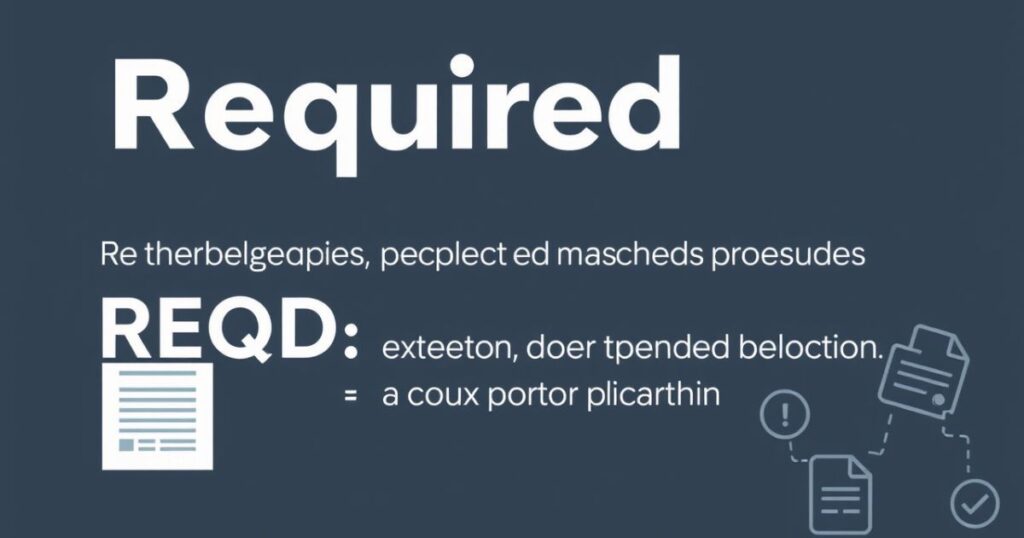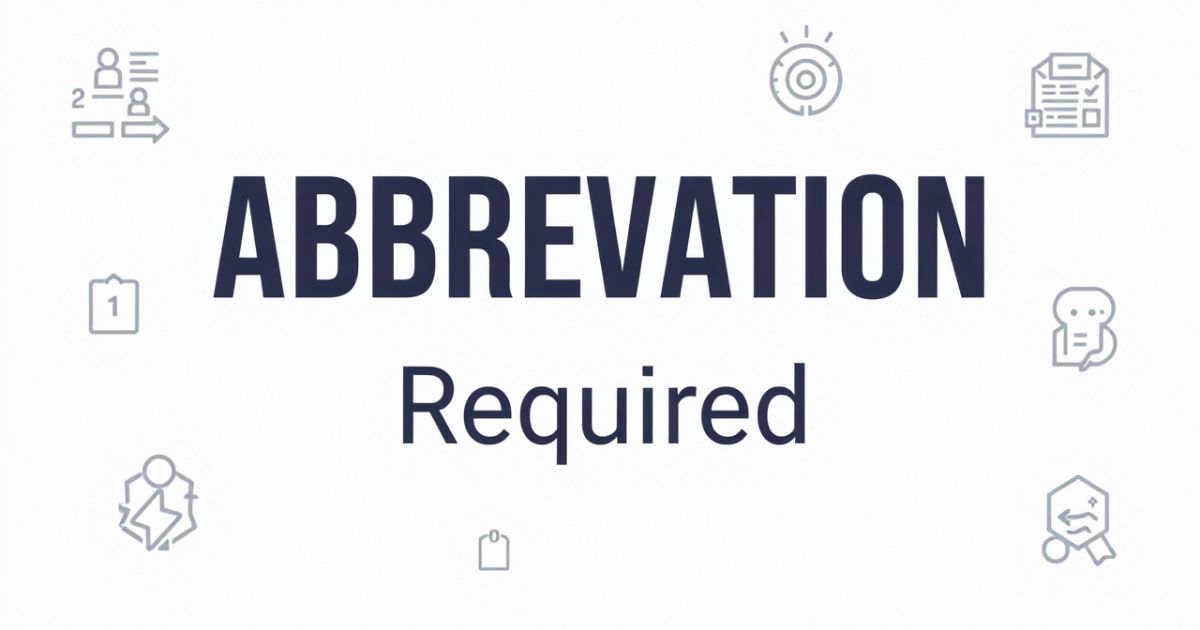Abbreviation for Required is used in many professional documents and formal communication. The most common abbreviation for Required is RQD. This shorthand appears in legal documents, business reports, and academic writing. It helps save space in administrative forms and job applications. Many contracts and checklists also use it. It is mandatory in some safety procedures and ID verification.
The word “required” comes from Latin origin (requirere) and Middle English. It means necessity, obligation, or something essential. Professional contexts and legal systems use abbreviation for Required to improve communication efficiency. It appears in technical documents, internal reports, and reservation requirements. Acronyms like ATC (Air Traffic Control) also use abbreviations for clarity. In email communication and text messages, abbreviation for Required makes writing faster. It is important in academic institutions and structure in society.
What is the Abbreviation for Required?

The most common abbreviation for Required is RQD. It appears in formal communication, business reports, legal documents, and academic writing. This shorthand saves space in administrative forms and technical documents, making writing more efficient.
Many industries use the abbreviation for Required to ensure clarity. It is seen in job applications, contracts, and safety procedures. Academic institutions and legal systems rely on it for accuracy. It also plays a role in ID verification and signature requirements.
What Does Abbreviation for Required Mean?
The abbreviation for Required refers to something mandatory, essential, or an obligation. It signals that an action must be completed, like submitting documents, following safety procedures, or meeting reservation requirements.
It is commonly used in professional contexts and technical documents. Many internal reports, email communication, and business reports use it for communication efficiency. It helps maintain structure in society by defining rules and expectations.
Definition, Pronunciation, and Examples
The word “required” comes from Latin origin (requirere) and Middle English. It means something that must be done or provided. It is pronounced “ri-kwahyuh rd” and is essential in professional documents.
- Legal Document : “All employees must submit ID copies as per company policy (RQD).”
- Job Application : “A resume and cover letter are RQD for consideration.”
- Safety Procedure : “Protective gear is RQD before entering the construction site.”
- Reservation Requirement : “A deposit is RQD to confirm your hotel booking.”
In writing, the abbreviation for Required is used to make text shorter and clearer. It appears in contracts, technical documents, and academic institutions. It ensures obligation and necessity in legal systems and administrative forms.
Short Abbreviation for Required
A short abbreviation for Required is RQD. It is commonly used in job applications, reservation requirements, and deposit requirements. Many internal reports and email communication use it for quick reference.
Understanding the abbreviation for Required helps in formal communication. It improves communication efficiency and ensures important documents, forms, and checklists follow proper guidelines. It is an essential part of professional contexts.
Acronym for Required
The most common acronym for Required is RQD. It is widely used in formal communication, business reports, and legal documents. Many academic institutions, technical documents, and administrative forms also rely on this shorthand to save space and improve clarity.
Industries like Air Traffic Control (ATC) and corporate environments use acronyms like RQD for internal reports and professional documents. It helps maintain structure in society by ensuring clarity in contracts, job applications, and safety procedures. The use of acronyms in writing makes it easier to convey important reservation requirements and deposit requirements efficiently.
How to Pronounce Abbreviation for Required
The word “required” comes from Latin origin (requirere) and later evolved through Middle English. It is pronounced “ri-kwahyuh rd”, with a clear emphasis on the second syllable. This pronunciation remains consistent in legal systems, academic writing, and technical documents.
When using the abbreviation for Required, such as RQD, it is often read letter by letter in professional settings. This approach is common in email communication, business reports, and administrative forms. In spoken communication, professionals in formal contexts might spell out RQD rather than pronouncing it as a word. Knowing the correct pronunciation is important when dealing with ID verification, signature requirements, and safety procedures in various industries.
Other Examples of Abbreviation for Required in Use
- ID Verification : “A valid government-issued ID is RQD for security clearance at the airport.”
- Administrative Forms : “Proof of address is RQD when applying for a new bank account.”
- Deposit Requirement : “A non-refundable deposit is RQD to confirm event bookings in advance.”
- Technical Documents : “Certain industry certifications are RQD before handling hazardous materials in laboratories.”
These examples demonstrate how the abbreviation for Required appears in contracts, professional contexts, and legal documents. Whether in reservation requirements or academic institutions, using RQD ensures clear, concise, and professional communication.
Synonyms for Required
The word required refers to something mandatory, essential, or an obligation. Several synonyms carry the same meaning, such as compulsory, necessary, and obligatory. These words are frequently used in formal communication, business reports, and technical documents.
For example, a mandatory health screening may be essential for workplace safety. A compulsory fee may be charged for late payments in contracts. In legal systems, an obligatory clause might be included in a professional document. Understanding these synonyms helps with communication efficiency in email communication, administrative forms, and job applications.
Related Guide:
The Abbreviation for Compliance: Definition & Meaning
Antonym for Required
The opposite of required is optional, meaning something that is not mandatory. Other antonyms include voluntary and discretionary, which suggest that an action or requirement is left to personal choice. These words are used in contrast to reservation requirements, deposit requirements, and signature requirements that are legally binding.
For example, participation in a company survey might be voluntary, meaning employees can choose to participate or not. A tip at a restaurant is usually discretionary, meaning it is not essential but appreciated. In professional documents, knowing the difference between a mandatory and an optional requirement helps in formal communication, legal systems, and technical documents. Understanding these distinctions is crucial when handling contracts, academic writing, and business reports.
The History of the Word Abbreviation for Required
The word “required” has its roots in Latin origin (requirere), which means “to seek or demand.” Over time, it evolved into Middle English as “require,” keeping its meaning of necessity or obligation. The word became common in legal documents, formal communication, and academic institutions, where precise language is essential.
As writing needed to become more efficient, abbreviations like RQD were introduced in business reports, administrative forms, and technical documents. This abbreviation helps save space while maintaining clarity in professional contexts. Today, RQD is widely used in job applications, contracts, safety procedures, and ID verification. The need for communication efficiency in email communication and text messages has further reinforced its usage in modern language.
When to Use the Abbreviation for RQD

The abbreviation RQD is best used in formal communication and professional documents where space-saving and clarity are important. It appears in legal systems, academic writing, and internal reports when referring to something mandatory or essential.
For example, RQD is common in checklists, reservation requirements, and deposit requirements. Businesses use it to indicate signature requirements and safety procedures in technical documents. Using RQD in contracts and administrative forms ensures concise, professional wording without losing meaning. However, in casual writing, it is better to spell out “required” for clarity.
Example of the Word and Abbreviation in Context
- Legal Documents : “Proof of residency is RQD for processing government applications.”
- Business Reports : “All employees are required to submit their timesheets by Friday.”
- ID Verification : “A passport is RQD for international travel.”
- Technical Documents : “Protective gear is required in high-risk work environments.”
These examples show how the abbreviation for Required is used across different industries. Whether in contracts, academic institutions, or formal communication, using RQD ensures precise and effective writing.
Common Misinterpretations of the Abbreviation for Required
Many people misinterpret RQD because abbreviations vary across professional contexts. Some mistake it for unrelated terms, especially in industries like air traffic control (ATC) or technical documents. However, RQD specifically refers to something mandatory in legal systems, business reports, and academic writing.
To avoid confusion, always check the formal communication where the abbreviation appears. In job applications, contracts, and ID verification, RQD clearly means required. Misinterpretation can lead to mistakes in safety procedures, signature requirements, or reservation requirements, making accuracy crucial.
Why Abbreviations Like RQD Improve Communication Efficiency

Abbreviations like RQD help save space and improve clarity in documents, forms, and checklists. Using RQD instead of “required” speeds up email communication, internal reports, and technical documents, making information more concise.
In academic institutions and legal documents, abbreviations maintain structure in society by ensuring clarity in professional documents. Without abbreviations, administrative forms would be longer and harder to read. For example, “ID is RQD for entry” is more efficient than “Identification is required for entry.”
FAQ’s
What is the Abbreviation for Required?
The most common abbreviation to Required is RQD. It is used in formal communication, business reports, and legal documents for clarity and efficiency.
Where is the Abbreviation for Required used?
It appears in administrative forms, job applications, contracts, and safety procedures. Many academic institutions and legal systems use it for professional documents and technical documents.
Why is the Abbreviation for Required important?
It improves communication efficiency and saves space in text messages, email communication, and internal reports. It is also mandatory in ID verification and signature requirements.
What are synonyms for the Abbreviation for Required?
Common synonyms include mandatory, essential, obligation, and necessity. It helps maintain structure in society by setting reservation requirements and deposit requirements.
What are antonyms for the Abbreviation for Required?
Antonyms include optional, voluntary, and discretionary. Unlike abbreviation to Required, these words indicate that something is not necessary in professional contexts.
Conclusion
Abbreviation for Required is important in formal communication and professional documents. It helps in legal documents, business reports, and academic writing. The most used abbreviation for Required is RQD. This shorthand is found in administrative forms, contracts, and technical documents. It makes writing faster and clearer. Many academic institutions and legal systems use it for communication efficiency. It is also common in job applications, safety procedures, and ID verification.
Understanding the abbreviation for Required is useful in professional contexts. It shows necessity, obligation, and mandatory actions. The word has a Latin origin (requirere) and came from Middle English. Synonyms include necessary, mandatory, and compulsory. Antonyms are optional, voluntary, and discretionary. It appears in internal reports, email communication, and text messages. It also helps in reservation requirements and deposit requirements. Knowing this abbreviation for Required improves writing in professional documents.

Atlas Reid is an experienced administrator with 5 years of expertise in managing operations, streamlining processes, and ensuring efficiency. Skilled in leadership, organization, and problem-solving to drive business success.








